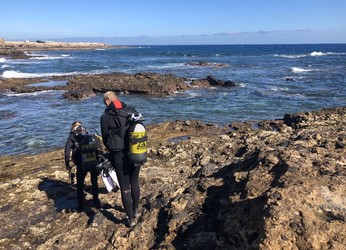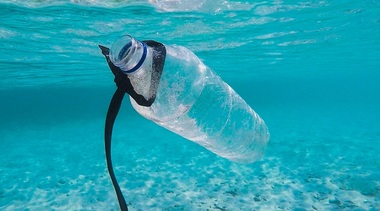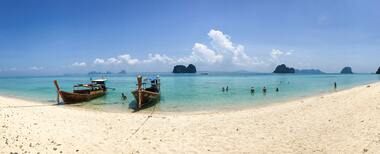Not sure what to gift your loved ones this Christmas? How about supporting a charity who’s all about saving our oceans?
Being dive enthusiasts, it’s a given that we love the ocean and all the marine life in it, but as years go by, it seems that all we hear is how our oceans are dying. It’s been heartbreaking to see many loved dive sites slowly decline in health and it’s natural beauty and you may be asking yourself ‘what can I do to help’?
One of the most effective thing we can do is to financially support non-profit organisations that are on the ground (or in the water) day in and day out working from both a public and political level to save and protect our oceans. To help you decide where to best put your money to make change, we've come up with this list of what we think are some of the best marine/ocean conservation non-profits to donate to.
Project AWARE focus their attention on community, looking to implement change on the local level through beach and ocean clean-ups, as well as on a political scale by pushing for ocean-positive legislation changes across the world. Their focus for 2019 was (and continues to be) the fight against plastic debris, as well as protecting sharks and rays. They managed to secure trade controls for 18 species at CITES CoP18. Go online to sign the petitions they support (which is free and makes a huge difference), including ending mako shark fishing. Plus, learn more about adopting your own dive site!
Take 3 for the Sea - A Clean Beach Initiative is an Australia based non-profit organisation focussing on the reduction of plastic pollution in the oceans and beaches. Educating people on the risks of marine plastic pollution is critical to changing behaviours and the organisation encourages beach-goers to take just three pieces of rubbish before leaving the beach and places near any waterways. Millions of tons of plastic end up in our oceans every year and this initiative believes in turning small efforts into big results to protect our oceans from plastic pollution.
The Sylvia Earle Alliance champions are working to save what they call ‘Hope Spots’, aka areas of ocean most critical to our survival. It’s shocking to hear that at this point in time, less than six percent of our oceans are protected. Through awareness and the creation of new MPAs (Marine Protected Areas), Sylvia and her team are focusing their efforts on areas including the Coral Sea, South Africa’s False Bay, the Palmyra Atoll (south of Hawaii), and more.
Sea Shepherd’s mission is to protect defenceless marine wildlife and end the destruction of habitats in the world’s oceans. Since 1977, the organisation has used innovative direct action tactics to defend, conserve and protect the delicately-balanced biodiversity of our seas and enforce international conservation laws. Non-lethal tactics have been used in their ocean going operations, including scuttling and disabling whaling vessels, intervening in seal and whale hunts and throwing bottles of foul-smelling butyric acid onto whaling vessels at sea. They are most recognised for obstructing Japanese whaling activities in the Southern Ocean since 2005.
The US-based Woods Hole Oceanographic Institution is a not-for-profit research and higher education facility that carry out studies of all aspects of marine science and engineering. The institution which houses scientists and engineers, works to resolve some of the significant problems currently being faced by our oceans. The organisation is also involved in delivering unbiased information to help inform public policy, and also increasing awareness among people about the importance of protecting oceanic resources.
It is predicted that up to 273 million sharks are killed, by humans, every year, with an average of approximately 100 million. This equates to an average of almost 274,000 sharks every day. SOS are actively involved in shark conservation efforts around the world. Shark protection and conservation is of upmost importance if we wish to maintain a healthy balance in the world's oceans.
Abandoned fishing gear is continually killing off many of the ocean’s most beloved animals, from dolphins and seals, to whales and sharks. This organisation works worldwide with the fishing industry, governments and various NGOs (non-governmental organisations) to remove nets to safeguard ecosystems, marine life and humans spending time in the ocean. Current projects include the recovery and recycling of lobster pots in Maine through NOAA (National Oceanic and Atmospheric Administration) and the Maine Lobster Fisherman Foundation, as well as GhostNets Australia to recycle ghost nets into art, and many more.
Nakawe Project is a not-for-profit and proactive organisation, founded in 2014 in Barcelona, formed by a small group of professionals from different sectors committed to the environment and humanity, with a shared passion - the ocean. Our first mission is to help save the world’s dwindling shark populations.
As a not-for-profit organisation, their objective is to collaborate with governmental and non-governmental institutions, with the diving industry, industrial fisheries, recreational anglers and, of course, with all shark lovers worldwide.
Founded by Paul Nicklen, a well-respected polar photographer, and conservation pioneer, Cristina Mittermeier, this organisation focuses on capturing the beauty of our oceans in photos to spark a worldwide passion to save them. SeaLegacy organises localised social media campaigns to alert citizens of pressing issues. Past campaigns have included a project that highlighted the threat that gas and oil exploration in Lofoten, Norway, posed to cetaceans; they succeeded in persuading the new prime minister to end the practice. Moreover, the organisation orchestrates 6 – 12 expeditions a year, actively seeking volunteers for these trips to the Arctic, the Caribbean and everywhere in between.
Your Bass Guy is a fishing organization that spreads awareness on fish conservation through in-depth articles on problems in the fishing industry. They advocate for technological solutions (such as Fishtek Marine) and the use of territorial use rights in fisheries management (TURF) to better regulate the fishing industry so commercial fishing doesn't deplete our oceans. Overfishing, farmed fish, fish depletion, government subsidies, ghost fishing, and IUU fishing are all issues they tackle.


